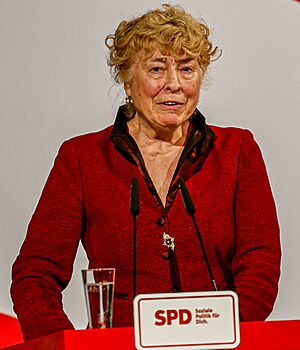Gesine Schwan facts for kids
Quick facts for kids
Gesine Schwan
|
|
|---|---|

Schwan in 2023
|
|
| President of the Viadrina European University | |
| In office 1 October 1999 – 30 September 2008 |
|
| Preceded by | Hans Weiler |
| Succeeded by | Gunter Pleuger |
| Personal details | |
| Born | 22 May 1943 Berlin, Germany |
| Political party | Social Democratic Party |
| Spouses |
Alexander Schwan
(died 1989)Peter Eigen
(m. 2004) |
| Education | Free University of Berlin University of Freiburg |
Gesine Schwan (born Gesine Schneider on May 22, 1943) is a German professor who studies politics. She is also a member of the Social Democratic Party of Germany, a major political party. Her party chose her twice to run for the federal President of Germany. In 2004 and 2009, she ran against Horst Köhler but did not win the election.
Contents
About Gesine Schwan
Early Life and Family
Gesine Schwan was born in Berlin, Germany, on May 22, 1943. Her parents were Hans R. Schneider, a school inspector. During a difficult time in German history, her parents quietly resisted the government. They even hid a Jewish girl to keep her safe. After World War II, her family worked hard to help Germany and Poland become friends again.
In 1969, Gesine married her first husband, Professor Alexander Schwan. They had two children together. Alexander passed away in 1989. In 2004, Gesine married her longtime partner, Peter Eigen, in Berlin. Peter used to work for the World Bank. He also started an organization called Transparency International, which works to fight corruption around the world. Gesine is very involved in helping Germany and Poland understand each other better. She supports many projects that encourage friendship between the two countries.
Her Studies and Teaching Career
Gesine Schwan finished high school in Berlin in 1962. She then went to the Free University of Berlin and the University of Freiburg. She studied history, philosophy, languages, and political science.
After studying in Poland, she earned her Ph.D. in 1970 from the Free University of Berlin. Her research was about a Polish philosopher named Leszek Kołakowski. She then became an assistant professor at the same university. In 1975, she completed more research on the ideas of Karl Marx, which allowed her to become a full professor.
In 1977, Gesine Schwan became a full professor in the Political Science Department at the Free University of Berlin. She studied many topics, including political ideas, how people think, and different types of government. She also spent time doing research in the USA and at Cambridge University in England. From 1993 to 1995, she was the dean (a leader) of the Political Science Faculty at her university.
In 1999, Gesine Schwan became the president of the Viadrina European University in Frankfurt (Oder). She led this university until 2008.
Her Work in Politics
Political Ideas and Involvement
Gesine Schwan has always been part of the Social Democratic Party (SPD) in Germany. She helped start a group within the SPD called the Seeheimer Kreis in 1974. This group had more traditional views. In 1977, she joined the SPD's Commission for Fundamental Values.
In 1984, she was removed from this group because she disagreed with the party's approach to Eastern European countries. She believed Germany should support people who spoke out against their governments, not just work with the governments themselves. She rejoined the commission in 1996.
Since 2002, she has led the German-Polish Forum with Janusz Reiter. In 2004, the German government chose her to be the coordinator for cooperation with Poland. She kept this job even when a new government came into power. In 2009, she spoke out against the former German Chancellor Gerhard Schröder. She felt he was too friendly with Vladimir Putin and didn't pay enough attention to Poland's concerns about Germany and Russia.
In 2010, Gesine Schwan supported the Spinelli Group in the European Parliament. This group wants to make the European Union (EU) more united, like a single country.
Running for President
On May 23, 2004, Gesine Schwan was the SPD's choice for the German presidential election. She received many votes but was defeated by Horst Köhler.
In 2008, the SPD announced that Gesine Schwan would run for president again in 2009. Once more, she ran against Horst Köhler. However, Köhler was re-elected for his second term.
Later Political Activities
In 2019, Gesine Schwan decided to run for a leadership position within her party, the SPD. She ran alongside Ralf Stegner for the role of co-chair.
Other Activities and Awards
Community Involvement
Gesine Schwan is involved in many different organizations. She is a member of the Board of Trustees for the Einstein Forum and CARE Deutschland-Luxemburg. She also serves on the International Council for the Museum Berggruen. Since 1994, she has been a trustee for the Theodor Heuss Foundation. From 2018 to 2019, she was a member of the Board of Trustees for the Technische Universität Berlin.
Awards and Recognition
Gesine Schwan has received several important awards for her work:
- 1993: Federal Cross of Merits (Bundesverdienstkreuz 1. Klasse)
- 1999: Urania-Medal for her work in scientific education.
- 2002: Commander's Cross of the Order of Merits of the Federal Republic of Germany (Großes Bundesverdienstkreuz)
- 2004: Marion Dönhoff Award for helping different countries get along.
- 2006: An Honorary doctor degree from the European University Institute in Florence.
See also
 In Spanish: Gesine Schwan para niños
In Spanish: Gesine Schwan para niños
 | John T. Biggers |
 | Thomas Blackshear |
 | Mark Bradford |
 | Beverly Buchanan |

